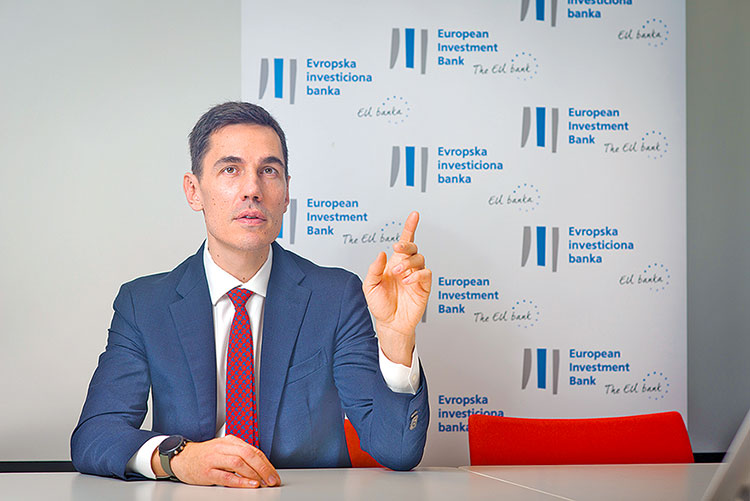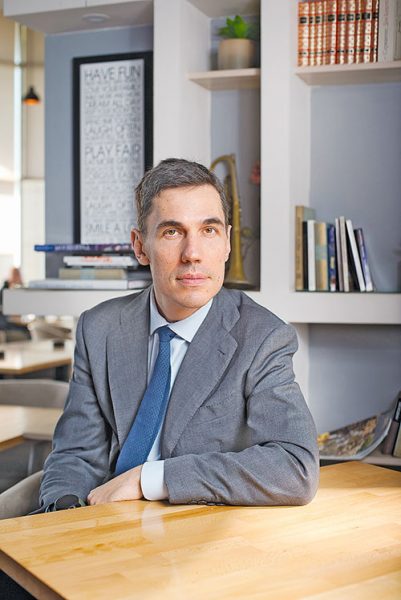The EIB will work closely with the European Commission on the rollout of the Economic and Investment Plan, the green and digital agenda for the Western Balkans. It has earmarked close to €30 billion to support sustainable mobility, the green and digital transition, and the creation of a common market.
Over the last few years, the modernisation and rehabilitation of key transport infrastructure in the Western Balkans has been a major driver of economic development. There has also been significant progress on integrating the region into the Europpean common market. The recent abolishing of roaming charges in the Western Balkans, green corridors for trade and passport-free travel will increase quality of life and make it easier to do business.
Since 2009, the EIB has provided close to €10 billion to the Western Balkans, investing in all key economic sectors and supporting vital infrastructure projects and the development of the private sector. As one of the largest foreign investors in the region, it has helped modernise transport, healthcare and education facilities, and environmental protection sectors, thus contributing to economic growth in the region before the pandemic, while at the same time paving the way for the transition towards a carbon-neutral economy and sustainable transport.
“Today, air and water pollution have become one of the most serious issues affecting the livelihood of people across the region, coupled with the consequences of climate change, which is causing more frequent and costly natural disasters. This is why environmental protection and climate action require our most urgent attention,” says Alessandro Bragonzi, Head of EIB Regional Representation for the Western Balkans.
Where are we when it comes to making this region more attractive for business and improving quality of life?
A favourable economic climate for doing business depends largely on the further upgrading and stabilising of the legislative framework, the judicial and anti-corruption system, and the extent and quality of transport, energy and digital infrastructure, as well as on the conditions that stimulate entrepreneurship, innovation, employment creation and inclusive job opportunities. The EIB’s role, as a financier, is to help in the achieving of these goals by providing more accessible financing and technical support to local economies.
According to the World Bank’s Doing Business report for 2020, Serbia ranks 44th, with an overall score of 75.7 out of 100. The country has managed to increase its score compared to previous years, mostly in the areas of protecting minority investors, resolving insolvency and generating electricity. In other segments, like construction permits and taxes, there is still room for improvement.

The EIB is also looking forward to seeing Serbia progress in the EU accession process, in line with the European Commission’s enlargement report, and advance in the areas of judiciary, freedom of expression and the fight against corruption and organised crime.
Which reforms do you see as enablers of future growth, in the region and in Serbia specifically?
As the bank of the European Union, we strongly support convergence with EU policies and standards, which will also enable the transition to a greener economy and integration into EU value chains.
We firmly welcome reforms to public investment management that will improve the efficiency of project preparation and implementation. The transition to a private sector-orientated economy is also essential for driving innovation, competitiveness and the creation of new jobs. The improvement of court efficiency, anti-corruption legislation and the rule of law should also be continued, and the EIB will support all these processes until the region has been fully integrated into the EU market and people’s living standards have improved.
In the green transition, the EIB plans to justly support the Western Balkans in moving away from coal and switching to more efficient, diverse and safer energy sources that generate lower greenhouse gas emissions
What are your priorities when it comes to the green and digital agenda?
The EIB continues to help the Western Balkans improve its digital capacities and prepare for a new wave of digital revolution that is yet to unfold. Digital capacities will play a major role in the competitiveness of global economies, especially when it comes to decarbonisation, sustainable mobility and smart solutions for businesses. In Serbia, we’ve already started investing in digitalisation, both in the public and private sectors. In 2020, the EIB Group signed a €65 million loan to provide digital infrastructure, equipment and digital skills training for teachers in over 1,500 Serbian schools. It allocated an additional €60 million in guarantees from its subsidiary, the European Investment Fund, to partner with financial institutions supporting small businesses in extending their digital capacities. Moreover, the EIB recently approved the financing of the 5G rollout in Serbia, and the development of broadband connections in remote areas across the Western Balkan countries to increase broadband penetration and reduce the digital divide.
The transition to renewable energy sources has already led to heated debate, as coal is a cornerstone of the current energy production approach. How long and arduous is the transition to renewable energy likely to be, and how will you support this process?
Climate-friendly investments and the energy transition are not just part of another economic programme set up to accelerate growth – they are the bare minimum required to save the planet from the devastating rise in temperatures and all the tragic events that will inevitably follow, such as extreme weather, devastation and consequent social unrest. Floods in Belgium and Germany, tornadoes in the Czech Republic, forest fires in Greece, droughts in Serbia affecting agricultural production – these are all wake-up calls.
The good news is that green investments can also help us build a sustainable and more balanced long-term economic model. This can also speed up recovery from COVID-19 – climate action is in fact a once in a lifetime opportunity to save the planet and improve our societies. To make sure no one is left behind, the European Union has allocated special funds and created tailored programmes for partner countries. As the EU climate bank, the EIB will be ready to support the Western Balkans on this road.
Air pollution is one of the biggest problems throughout the Western Balkans, and sustainable transport is seen as one of the answers to this problem. Apart from developing major railroads, how will you support this sector?

Efficient and safe transport links between countries in the Western Balkans, and between the region and the European Union, are essential for improved regional cooperation and trade.
However, we are facing a twofold challenge that is changing the course of the global economy – climate change and the COVID-19 Pandemic.
The transport sector will address the climate issue by creating more digitallybased and sustainable solutions with a lower carbon footprint. Rehabilitating the rail network is an important stepping stone in this, as it provides a more energy-efficient mode of transport. The EIB will step up its investments in this sector and, as part of the European Year of Rail, we are organising the European Commission’s Rail Summit, together with the Transport Community and the European Bank for Reconstruction and Development, which will be held in Belgrade in September. We are looking forward to promoting sustainable transport solutions and platforms to enable the modernisation of infrastructure, the digitalisation of rail systems and the transformation of transport. Waterway mobility is another example of sustainable transport and the EIB is supporting improvements in waterway navigation along the pan- European corridors in Serbia, with 100 million euros worth of investment having already been signed.
In urban transport, which creates complications in large cities due to pollution, the solution is the upgrade and electrification of public and private fleets and fixed-line transport networks leading to a modal shift in passengers’ behaviour.
COVID-19 has exposed the strengths, but also the vulnerabilities, of Serbia’s healthcare system. You have already supported the construction and renovation of clinical centres in Serbia and the provision of state-of-the-art medical equipment. What’s next?
The EIB is one of Serbia’s strategic partners in the development and upgrade of the national healthcare system.
We are glad to see that our €250 million investment in healthcare to date has helped the country respond to COVID-19 more efficiently and improved the quality of services and medical capacities. We are also looking forward to the completion of the expansion of clinical centres in Vojvodina and Belgrade, which will soon become fully operational. Once completed, everyone across Serbia will benefit from a more resilient healthcare system with increased accessibility, improved capacities and higher levels of medical care.
However, there are still many gaps that need to be addressed, both in Serbia and across the whole region. Further improvement of medical and educational capacities will be our priority.
We are continuing to cooperate with the Serbian Government to support centres of excellence for higher education and innovation
Innovation and sustainability seem to be the keywords for the post-COVID recovery. You have already supported the construction of some of the most innovative structures in Serbia, such as the BioSense Institute. How does the EIB intend to support technological innovation?
The EIB is one of the leading global investors in innovation. In 2020 alone, the EIB invested €14 billion in innovation across the world, in various projects that support sustainability, new technologies and innovative cures and therapies for a number of diseases.
By allocating €200 million to the research and development sector in Serbia, we contributed to the construction of three innovation centres that became hubs for high-tech start-ups and centres of excellence that bridge science and industry in the most advanced fields. By boosting innovation, our goal is to encourage technology start-ups and the development of smarter and more sustainable solutions in all fields, including the environment, transport, medicine, industry and education. We are glad to see that many companies working in the innovation centres have managed to develop state-of-the-art products and services based on advanced technologies, and that these have already penetrated local and global markets.
From that perspective, how capable are Serbian companies of catching up with the digital transformation?
The digital revolution has started transforming industries and we will see its real impact as it gains momentum. Data from the EIB Investment Survey show that firms that have adopted digital technologies are more productive and innovative, and more likely to export and create new jobs. On the other hand, our CESEE Bank Lending Survey shows that COVID-19 has significantly accelerated digitalisation in the Western Balkans, mostly in the areas of internal processes, client outreach and risk management. To encourage companies in Serbia to extend their digital capacities, the EIB Group signed the first guarantee agreement in 2020 under the scope of the digitalisation programme for small businesses.
| SUPPORT The EIB will provide technical and financial assistance to governments, local communities and other partners in accessing funds for their strategic projects | FUNDAMENTALS The new enlargement methodology, which places an emphasis on the rule of law and basic freedoms, is key for the stability of the entire Western Balkans | MISSION The EIB aims to set out a blueprint for sustainable development and green recovery, both in the region and globally |
|---|